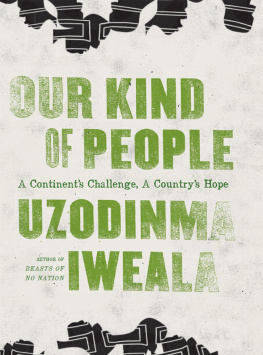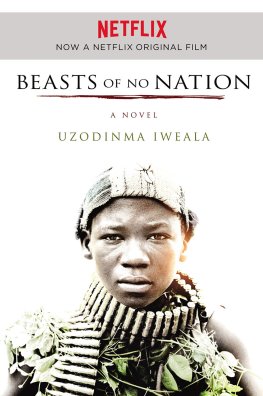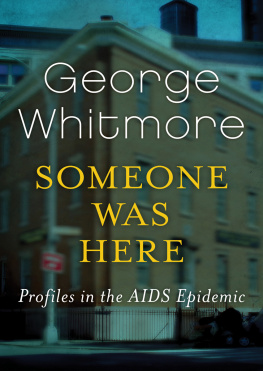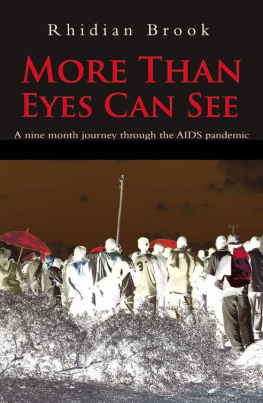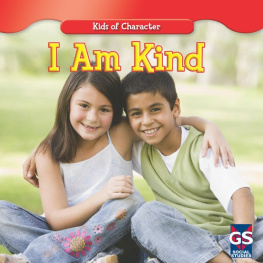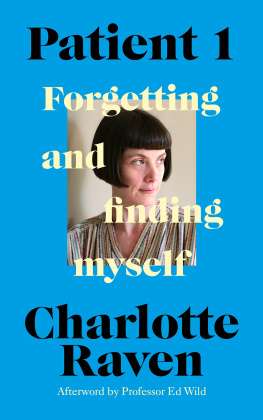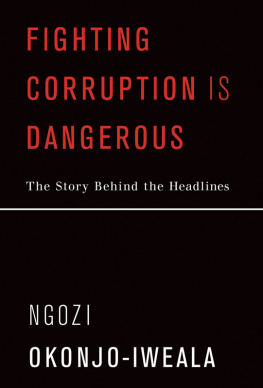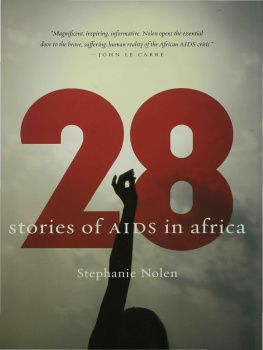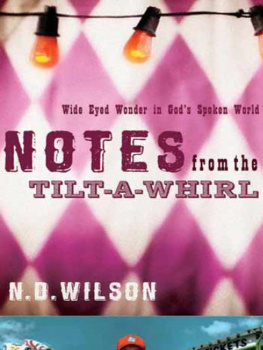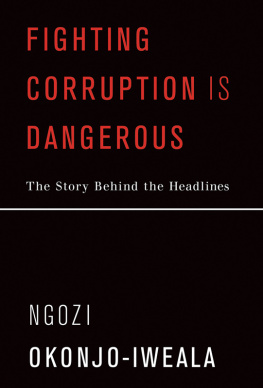OUR KIND
of
PEOPLE

A CONTINENTS CHALLENGE, A COUNTRYS HOPE
Uzodinma Iweala

CONTENTS
O ur Kind of People has been a long time in the making. There are many who have helped me along the way.
First and foremost, I owe much to all of you who, over the past few years, were kind and trusting enough to share some intensely personal stories with me. Many of you will remain anonymous, but your words, your thoughts, your experiences are this book. Thank you.
To Dr. Chukwumuanya Igboekwu: over the past few years, since we first spoke about HIV/AIDS in Nigeria, you have become a close friend. I am very grateful to you for your thoughts and your guidance on how to make this book a reality.
To Samaila Garba: I am full of admiration for the work that you have done. Your warmth and enthusiasm have always been an inspiration. I hope that in some small way this book embodies the spirit with which you approach your work.
I would be remiss if I did not thank the following people for the help and insight they have provided: Rolake Odetoyinbo, Helen Epstein, Paul Nwabuikwu, Femi Kuti, Jessam Nwaigbo-Okoi Edet, Ibrahim Umoru, Femi Adegoke (and everyone he introduced me to), Frank, and my friends at NACA and the Ministry of Health.
To my agents, Jeff and Tracy (and Andrew), and my editors, Tim and Eleanor, thank you for your encouragement and your willingness to stick with this project despite my taking a little detour through medical school. Id say I owe you one, but I actually still owe you one, so well just skip that.
To my research assistants: Desta, Katharine, and Rachael. Thank you for all your help with the nitty-gritty.
To my friends who have provided both moral and material support: I would not be where I am without you.
Emma: not only did you read this draft in its original form, you also housed me for the summer it took to turn it into something readable. I am so grateful for your help and friendship. Thank you, Tim and Eliot, for your kindness as well.
Larissa: thank you for all the lunches where you listened to me drone on about this book and my anxieties. Thank you for a thorough reading of my first draft and your equally thorough commentary. Thanks to you and Philip for housing me this summer. Last but not least, thanks to the girls for taking care of Maximus while I was away.
Ian: WLA. This book has wordsreal wordsbecause of you. Thank you for all the time you spent wrestling with not so very good drafts as though they were your own work.
Thenji: your cover, your thoughts on my chapters, and your appreciation of what it means to try to tell the right stories about our continent are all such a big part of what this book is. Thank you.
Elliot: you are one of the few people who really understand what writing means to me and what I hope to do with it. Thank you for listening and for reading.
Meehan: working with you was such a pleasure that I looked forward to our many therapyI mean editingsessions at your house as the highlight of my week. You have a mind for structure like I have never known and such a wonderful way of being brutally honest with the utmost love. I would not have made it through this book without you.
The Robins: consider this as me thanking each of you separately but wanting so badly to be able to call you the Robins. In completely different ways you have been a source of perspective, wisdom, and support.
Megan: your research was always on point, your transcriptions incredible, and your storiespriceless.
Ragamuffin, Louisa, Jennifer S., Steph, Julie, Rebekah, Jennifer B., Manka, Mary: thank you for your support, advice, and eyes.
Nina: you were there at the beginning, when this book was just an idea I pestered you withconstantly. Thank you for the poster, and thank you for still being there.
To my family: Uncle Chi-Chi and Auntie Uju (Lagos just isnt the same without you) and of course to Daddy, Mommy, Onyi, Andrew, Oke, Uch, Milo, and now Adaora. I love you all.
About one thousand dollars.
Refers to a program for the disabled championed by Nigerias then first lady Turai YarAdua.
The pagination of this electronic edition does not match the edition from which it was created. To locate a specific passage, please use your e-book readers search tools.
AIDS IS REAL
25 American Invention to Discourage Sex: Ogoh Alubo, Breaking the Wall of Silence: AIDS Policy and Politics in Nigeria, International Journal of Health Services 32 (2002), no. 3: 55166.
26 wipe out entire generations: Nigeria: Statement by His Excellency President Olusegun Obasanjo, 57th United Nations General Assembly, United Nations Secretariat, New York, Sept. 15, 2002, www.un.org/webcast/ga/57/statements/020915nigeriaE.htm.
27 4 percent of Nigerias population: National HIV/AIDS & Reproductive Health Survey, Federal Ministry of Health, Abuja, 2006.
27 34 million positive people: AIDS Epidemic Update 09 (Geneva: Joint United Nations Programme on HIV/AIDS, Nov. 2009), http://data.unaids.org/pub/report/2009/jcl700_epi_update_2009_en.pdf; UNAIDS World AIDS Day Report 2011 (Geneva: Joint United Nations Programme on HIV/AIDS, 2011), www.unaids.org/en/media/unaids/contentassets/documents/unaidspublication/2011/JC2216_WorldAIDSday_report_2011_en.pdf; National Policy on HIV/AIDS, Federal Government of Nigeria, 2009, http://nigeria.unfpa.org/pdf/ntpol.pdf
34 worst years of my life: Fred Adegbulugbe, I Waited Four Years for Death, interview of Rolake Odetoyinbo, Punch (Nigeria), Feb. 8, 2009, http://archive.punchontheweb.com/Articl.aspx?theartic=Art20090208193851.
35 I didnt know much about HIV: Jemi Ekunkunbor, HIV Made Me Feel Ugly and Battered but No MoreRolake Odetoyinbo Nwagwu, interview, Vanguard (Nigeria), Aug. 1, 2004, www.impactaids.org.uk/newsletter/Newletter_Archive/VAN1.htm.
35 wasnt in a hurry to kill me: Adegbulugbe, I Waited.
37 I dont want to go out and look like HIV: Ekunkunbor, HIV Made Me Feel Ugly.
STIGMA
57 only part of the story: Philip Alcabes, The Ordinariness of AIDS, American Scholar, Summer 2006, 1832, http://theamericanscholar.org/the-ordinariness-of-aids.
65 undesired differentness: Erving Goffman, Stigma: Notes on the Management of Spoiled Identity (New York: Simon & Schuster, 1986), p. 4.
68 Dearly beloved: Michel Foucault, The History of Madness, trans. Jean Khalfa (London: Routledge, 2006), p. 63.
69 dominant religious discourse: Daniel Jordan Smith, Youth, Sin and Sex in Nigeria: Christianity and HIV/AIDS-Related Beliefs and Behaviour among Rural-Urban Migrants, Culture, Health & Sexuality 6 (2004), no. 5: 42537 (p. 430).
69 sinful immoral lives: Ibid., 429.
71 AIDS is Gods way of checking: Ibid., 430.
72 Black shapes crouched: Joseph Conrad, Heart of Darkness and The Secret Sharer (New York: Signet Classics, 1997), 83.
73 continent of AIDS orphans: Christiane Amanpour, CNN Presents, Where Have All the Parents Gone? CNN, September 23, 2006, excerpt, YouTube, www.youtube.com/watch?v=zdDIZWOWkKA.
75 Traditional Ways Spread AIDS: Elisabeth Rosenthal, Traditional Ways Spread AIDS in Africa, Experts Say, New York Times, Nov. 21, 2006, www.nytimes.com/2006/ll/21/world/africa/21cameroon.html?pagewanted=all.
76 move between populations: Michael Specter, The Doomsday Strain,

